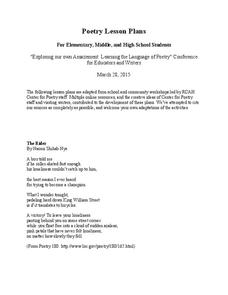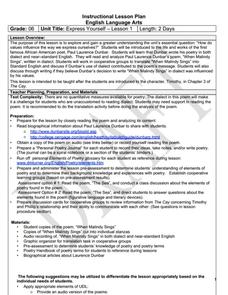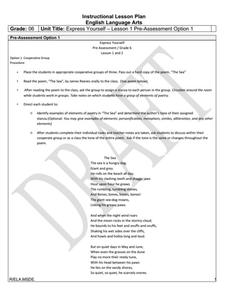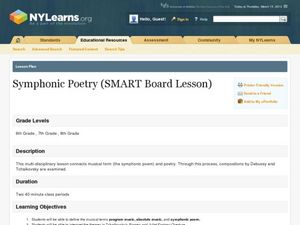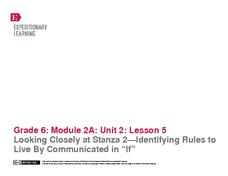Curated OER
Reading Poetry in the Middle Grades
Bring the beauty of "Nothing Gold Can Stay" by Robert Frost to middle school language arts. After learners read a copy of the poem, they follow an instructional sequence that focuses on sound, figurative language, and theme.
Residential College in the Arts and Humanities
Poetry Lesson Plans
Need some ideas for poetry lessons? Check out this packet loaded with suggestions for elementary, middle, and high school writers.
BW Walch
“Outsider” Poet Kay Ryan Goes from Poetry Club Reject to Poet Laureate
The cat might have got your tongue, but you can’t avoid the elephant in the room while you wait for the other shoe to drop. After all, the early bird gets the worm and the chickens are circling. After researching Poet Laureate Kay Ryan...
Curated OER
Genre Lesson: Poetry
Hook kids into a study on poetry elements by asking them to bring in the lyrics to their favorite song. Discuss the elements in one or two songs (preferably that demonstrate rhyme, figurative language, or a repeating phrase). Groups do...
Crafting Freedom
George Moses Horton: Crafting Virtual Freedom Through Poetry
What is "virtual freedom"? How about "enslaved entrepreneurship"? Class members will learn about these terms and much more as they read the poems and examine the life of George Moses Horton.
Hong Kong Special Administrative Region
Learning English through Poems and Songs
Exposing learners to the power of words in poetry is a stimulating way to learn languages. Songs, haikus, rhyming words, and narrative works are all employed in a resource for teaching English as a Second Language.
KIPP 3D Academy
Epic Poetry Unit
The Odyssey is the core text in this unit study of the hero's journey motif. Along the way, kids research Greek and Roman history, mythology, art, and epic poetry. The 104-page packet is perfect for homeschool or classroom situations and...
Teacher's Guide
Valentine's Day Acrostic Poem
L is for loving this Valentine's day acrostic poem in which class members use letters from the word love to guide their creative writing. Four different versions for you or your scholars to choose from make this poetry activity a win for...
Anti-Defamation League
Social Justice Poetry
Learners gain insight into how songs and poems express feelings of injustice. They also learn about literary devices and types of poems and make a personal connection when they write their own free verse poems about injustice.
Curated OER
6th Grade: Express Yourself, Lesson 1: Poem
While originally created to accompany The Cay, this poetry lesson could be used on it's own, especially if you are working on dialect. Class members conduct a close reading of "When Malindy Sings" by Paul Laurence Dunbar and listen to an...
Poetry Class
Tackling Climate Change
Get your kids thinking about climate change with a series of activities that include creating a ditty box poem for the planet, a poem that identifies concepts or objects they would want to preserve.
EngageNY
Writing the Final Narrative: Monologue or Concrete Poem
Get inspired to help those creative juices flow. Using the resource, scholars write their final, best version of their narrative monologues or concrete poems. Next, they prepare for a performance task by watching and discussing a video...
Teachers.net
Figurative Language
When is a staple remover a fanged monster? In your ELA classroom when you're teaching this fun figurative language lesson, of course! Get your young writers using figurative language by making a game of it. Give groups a paper bag full...
Curated OER
Express Yourself Pre Assessment Lesson 1 & 2
Find out how much your class knows about literary elements with a quick pre-assessment. Pupils work first individually to identify the instances of personification, metaphor, simile, and more, and then with group members to determine the...
Poetry Class
Eccentricity and Sound
What do Lady Gaga and Dame Edith Sitwell have in common? As they examine Sitwell's poetry, class members learn that the similarities are far more than their unique appearance.
EngageNY
Looking Closely at Stanza 1—Identifying Rules to Live By Communicated in “If”
Here is a lesson plan in which pupils connect themes and rules to live by from the story Bud, Not Buddy by Christopher Paul Curtis to those found in the poem If by Rudyard Kipling. First, scholars discuss their reading and review Bud's...
EngageNY
Looking Closely at Stanza 3—Identifying Rules to Live By Communicated in “If”
Just as Bud, from the novel Bud, Not Buddy by Christopher Paul Curtis, had rules to live by, so does the poem, If by Rudyard Kipling, but how do the two relate? Pupils delve deep into the poem's third stanza, participate in a grand...
EngageNY
Introducing “If” and Noting Notices and Wonders of the First Stanza
After reading chapter 14 of the story Bud, Not Buddy by Christopher Paul Curtis, scholars take part in a read-aloud of the poem If by Rudyard Kipling and compare it to the reading of Bud, Not Buddy. Learners then go deeper into the poem...
EngageNY
Notices, Wonders, and Vocabulary of the Third Stanza of “If”
How does one's experience reading a poem's text differ from listening to its audio version? Delve into the insightful question with the poem, If by Rudyard Kipling, as pupils compare and contrast their experience using a note-taking...
Curated OER
Symphonic Poetry (SMART Board Lesson)
Let music and poetry collide in this well-orchestrated language arts lesson plan. After studying program music and C. Debussy's Prelude to an Afternoon Faun, view the attached SMART board lesson plan to read through "Fog" by Carl...
Scholastic
Reading Poems From the Academy of American Poets Chancellors
Start a lesson on poetic voice with a peer to peer discussion on what characterizes the strength in the voice with which a writer chooses to express himself/herself. In pairs, readers are tasked with reading and creating T-charts for...
Scholastic
Selecting Favorite Poems From Historical Poets
Here is a poetry lesson that begins with a free-association activity focused on the word voice. Learners each sit alone for a moment and make sounds that express how they are currently feeling, and then turn to their partners to share...
EngageNY
Notices and Wonders of the Second Stanza of “If”
Here is an instructional activity that asks pupils to analyze poetry and sparks discussion about two different types of texts: asking how is the poem, If by Rudyard Kipling alike and different from the story, Bud, Not Buddy by...
EngageNY
Looking Closely at Stanza 2—Identifying Rules to Live By Communicated in “If”
Pupils take part in a close reading of the poem, If by Rudyard Kipling, in which they delve deep into its meaning and identify its rules to live by. As the grand discussion progresses, learners then relate the poem's rules with those...



